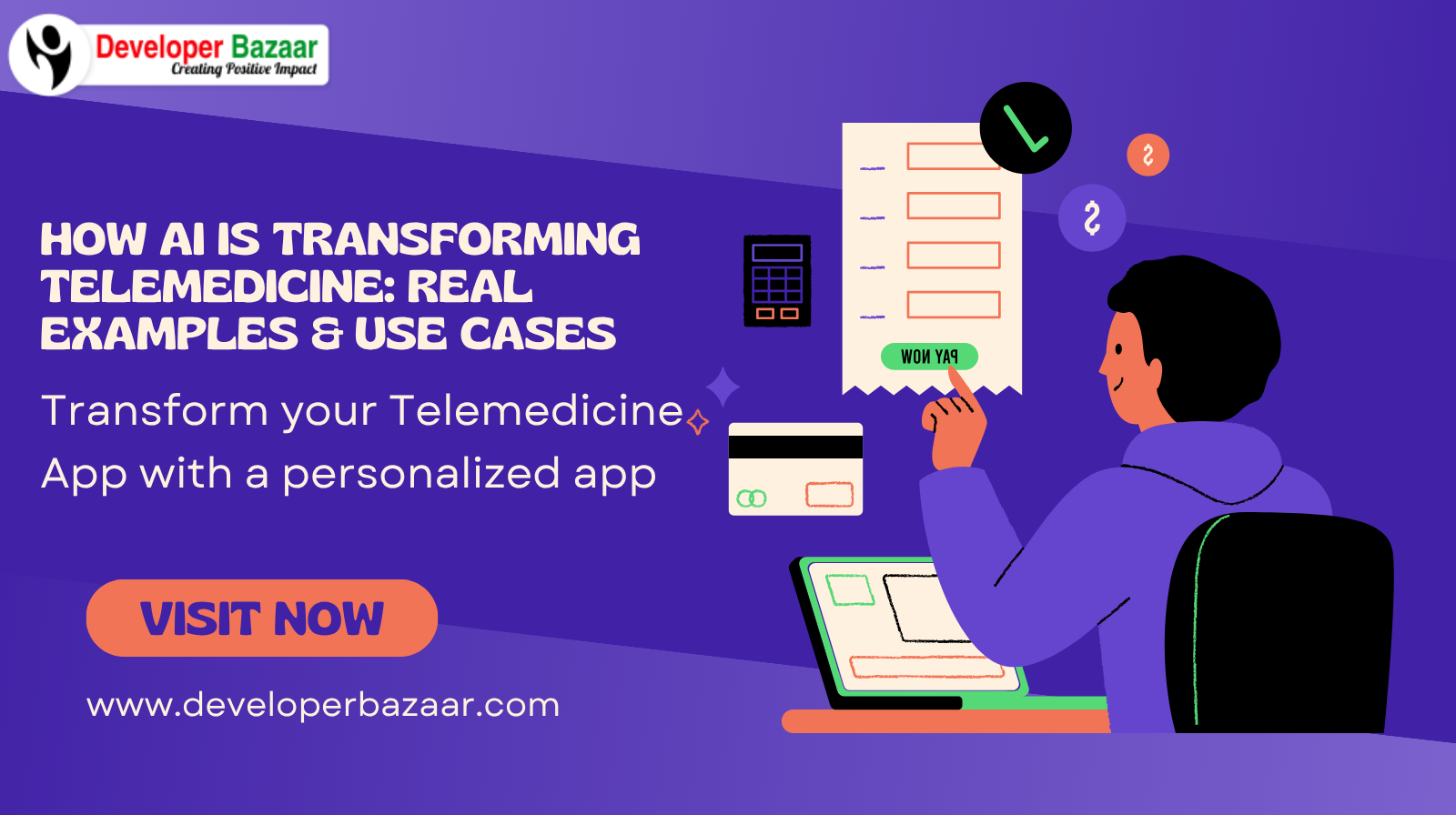How AI is Transforming Telemedicine: Real Examples & Use Cases
Telemedicine is fast becoming the norm for healthcare However, the most significant breakthrough is occurring thanks to the rise of Artificial Intelligence (AI). Nowadays hospitals, clinics along with digital healthcare startup companies are working with a Telemedicine app development company to create platforms that enable patients and doctors to communicate online, anytime, anywhere. Utilizing the latest technology for developing apps for telemedicine the platforms today have automated symptom check-ups and treatment recommendations health monitoring, as well as individualized health assistance. AI doesn’t replace doctors; it’s just helping them provide better treatment, and faster.
Why AI Matters in Telemedicine
AI enhances telemedicine by:
- Reducing diagnosis time
- Aiding doctors through data-driven insight
- Improving patient tracking
- Automating routine care tasks
- Identifying high-risk conditions ahead of symptoms become worse
This allows doctors to concentrate on patient care and not be distracted by the burden of dealing with administrative tasks.
Real Use Cases of AI in Telemedicine
1. AI-Powered Symptom Checkers
Before speaking to a doctor, patients can write down their symptoms using this app.
The AI system reviews the data and provides suggestions:
- Possible causes
- Care is urgently needed.
- Which expert to talk to?
Example:
A patient who is experiencing chest pain receives an email alerting them to visit an immediate cardiologist — aiding in avoiding delay in critical treatment.
2. Virtual AI Health Assistants
The assistants are:
- Answer patient questions
- Make appointments
- Provide reminders for medication
- Provide lifestyle guidance
They help reduce the burden on call centers in particular for hospitals that are large.
3. AI for Medical Imaging & Diagnostics
AI can analyse:
- X-rays
- CT scans
- Images of MRI
- Ultrasound-related reports
It detects abnormalities more quickly than conventional methods, assisting doctors to confirm diagnoses more quickly.
Examples:
Doctors looking over lung scans to detect pneumonia will receive alerts from AI immediately prior to assessing manually.
4. Predictive Health Analytics
AI monitors patient data to:
- Monitor long-term trends
- Predict risks (like stroke, diabetes, heart failure)
- Provide early treatment recommendations
This is particularly beneficial for those suffering from chronic illnesses.
5. Mental Health AI Support
AI-based mood monitoring and conversational help improve monitoring of emotional health particularly for those struggling with stress, anxiety or depression.
Where Fitness & Telemedicine Meet (Important Section)
Nowadays, health and wellness are inextricably linked. Patients do not just need treatment, they’re looking for preventive healthcare and individualized workout routines, tracking their sleep and nutritional advice.
It is here that AI-powered fitness systems can help.
Many healthcare institutions are now working with an Fitness app development company to create apps that can:
- Monitor your daily activity and take a nap
- Keep track of oxygen levels and heart rate by wearing wearables
- Offer AI-generated, personalized workout plans
- Health data can be synchronized directly with doctors via the telemedicine applications
Examples:
A heart patient who has had surgery is given a custom low-intensity workout program created by AI based on the stage of recovery and heart rate data and previous workout responses.
This is a whole care ecosystem which includes treatment and recovery, as well as prevention.
Developer Bazaar Technologies: Building AI-Driven Healthcare Platforms
Developer Bazaar Technologies specializes in creating modern fitness and healthcare platforms that combine AI to improve care delivery.
The solutions are:
- Telemedicine communication systems
- AI-powered checkers for symptom
- Digital prescription systems
- Integration between EHR and EMR
- AI fitness and health tracking modules
- Wearable device compatibility
- Real-time patient monitoring dashboards
They don’t simply create apps; they design digital experiences that are centered around the patient.
Benefits of AI-Driven Telemedicine
| Benefit | Impact |
| Faster Consultations | Reduces the time spent waiting |
| More Accurate Diagnoses | Better outcomes from treatment |
| Continuous Monitoring | Aids in preventing problems |
| Lower Healthcare Costs | Doctors can better manage patients |
| Personalized Care | Plans that are tailored to meet the individual’s needs |
Real Example: A Smooth Digital Patient Journey
- The patient describes symptoms on the app. AI suggests potential cause
- The app recommends the most appropriate specialist to choose from. A quicker doctor choice
- Doctor consults patient via video chat Doctor consults patient via video calls There is no need to travel
- AI aids doctor to review the health history of the patient – Better informed treatment
- App schedules follow-up appointments and medication reminders Constant care
The experience will be more plugged-in as well as faster and more secure than it ever was.
Final Thoughts
Future healthcare will be smart, connected, and patient-centric. Through the integration of AI into telemedicine, doctors are able to diagnose quicker as well as monitor patients remotely and provide highly customized treatment plans. To create such advanced platforms using a reputable telemedicine app development service guarantees strong security accessibility, compliance, and security. With the help of professional apps for telemedicine developed provided by partners like Developer Bazaar Technology Healthcare organizations can build powerful digital healthcare systems that are efficient and adaptable, as well as designed for the real needs of patients. The objective is straightforward: better care and delivery anywhere.












